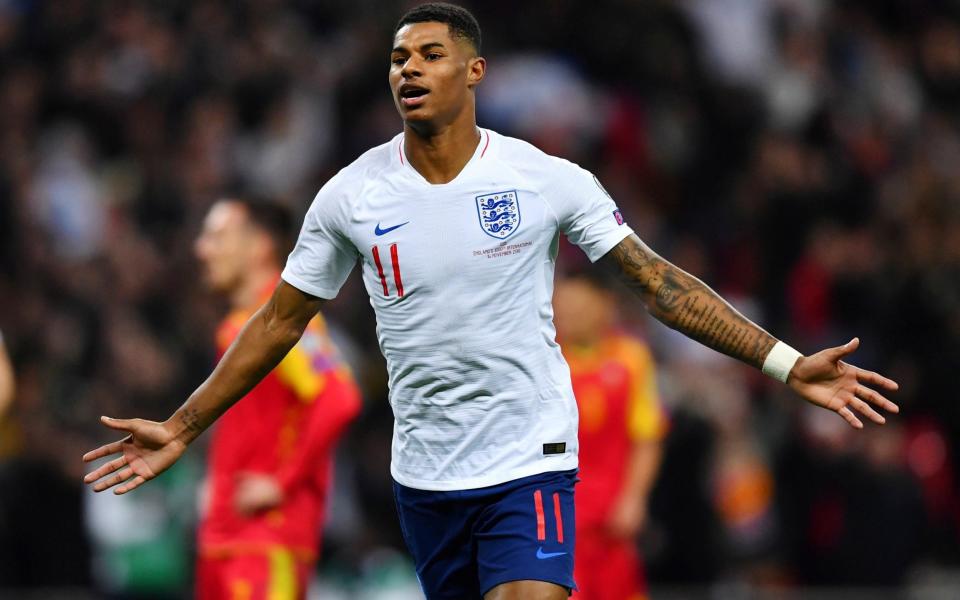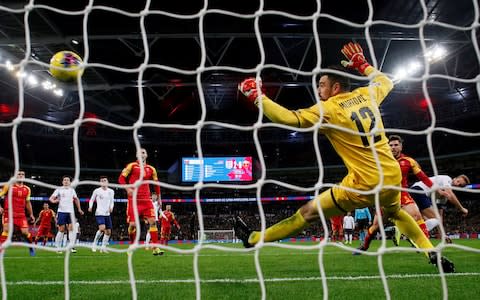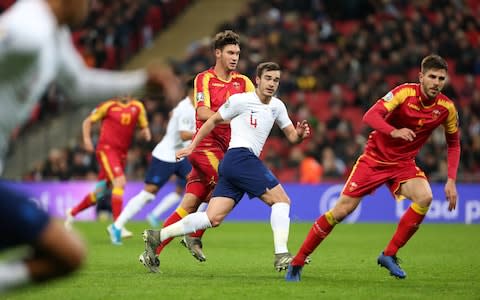Why England can be a force to fear at Euro 2020: Gareth Southgate finding right blend of youth, experience and grit

England have sealed Euro 2020 qualification as group winners with a game to spare - and there are plenty of reasons for optimism that Gareth Southgate's young team could do something special.
The Three Lions always knew that a point from their remaining two Group A matches would guarantee automatic qualification for next summer's finals, ensuring their pool matches would be played at Wembley in the process.
And England secured safe passage to Euro 2020 in some style as Harry Kane's hat-trick helped them celebrate their 1,000th match with a 7-0 win Montenegro on Thursday evening.
The Wembley factor
Now we know for certain that England will kick off their Euro 2020 campaign on Saturday, June 14 at Wembley.
If they are to win the competition five of their seven games will be there. The Football Association wants to play down the fact it is effectively a ‘home tournament’ (for fear of harming chances of landing a future one soon) but Gareth Southgate will accentuate the benefits having been part of England’s team in Euro 96 and knowing what effect that can have.
“It’s a wonderful opportunity next summer: three group games at home,” the England manager said. “It does give you, hopefully, home advantage. It’s going to be an incredible experience for the players, for our fans. We want to make Wembley somewhere that teams fear coming, that’s part of the message I gave to the players.”

A goal-hungry attack
England have scored 33 goals in seven qualification ties – more than any other European nation. Group A is an admittedly weak group but Southgate stressed the psychological effect it can have on England’s rivals, and the message it sends around Europe, if his team is winning by such big margins.
“I used to look at Germany in qualification and they were racking up sixes and sevens and we used to be struggling to break down teams who played with a low block (defend deep),” he explained. “We’ve now managed to play in a way that’s been able to solve that problem. Now we’ve got to solve the different sorts of problems that come with the higher-ranked opponents, and that’s the challenge of the next few months.”
Southgate is right to add the caveat of England's effectiveness against elite opponents. Croatia were arguably the first really good team they faced at the World Cup in a meaningful game and that semi-final ended in defeat.

They also lost twice to Belgium, albeit in a ‘dead rubber’ and a low-key third-place play-off. The Nations League campaign helped, especially winning away in Spain, but ultimately ended in disappointment against Holland.
There is a huge difference between smashing six past Bulgaria and seven past Montenegro when there is little “jeopardy” and being in a group with France or Belgium.
Southgate therefore needs to choose England’s opponents in their four friendlies – two in March, two before the Euros – wisely. He said there are “opponents pencilled in” and it would be no surprise if England go for a big South American team such as Brazil or Argentina. “We are always learning about the players more in the really big matches and the really high-pressure games,” Southgate said.
Finally... a settled formation
Southgate has been looking to play 4-3-3 ever since the World Cup but recently admitted that he might have to revert to three at the back because England cannot get enough midfield control. However, he seems to have gone with his instincts – to try and get the best out of England’s impressive attacking talent - and talked up Marcus Rashford’s return to form, before adding: “So, in those wide areas with Callum [Hudson-Odoi], with Jadon [Sancho], we can see the potential in him and with Raheem (Sterling), that’s why we’ve gone to a 4-3-3 because the quality of our wingers and the depth of that coming through and the depth of number eights coming through suits that way of playing, really,” Southgate said.
Unfortunately for Jack Grealish, Southgate appears to regard him as an attacking wide player - where he currently plays for Aston Villa - and so he faces stiff competition.
Harry Kane will be the main central striker, with Tammy Abraham a more-than-able deputy. Callum Wilson’s place is under threat, however, especially if, as is entirely possible, Jamie Vardy comes out of international retirement in the spring to be part of the squad.
A better midfield blend
A key decision appears to have been to go with Harry Winks as the single midfield ‘pivot’. It means Southgate has turned away from the idea of using a midfielder who used to be a defender – such as Declan Rice or Eric Dier – for one who is more creative.
“He’s finding himself out of Tottenham’s team so that’s an interesting challenge as well, but I couldn’t be happier with what he’s done in Bulgaria and against Montenegro,” Southgate said of Winks. “In fact, his performances for us in Spain and Lithuania from the very first ball, he has always played consistently well.”

Jordan Henderson is an automatic choice as one of the ‘number eights’ ahead of Winks, which leaves Alex Oxlade-Chamberlain, Ross Barkley, Mason Mount and James Maddison vying for the other slot. There is another interesting option: Trent Alexander-Arnold, who was moved from right-back to right midfield in the second-half against Montenegro. “I wanted to see Trent in there as well,” Southgate explained. “It’s something we’ve been talking about and it’s not easy to put a player in a position he’s not played regularly for his club because he’s not in the groove of doing it, but it was an experiment we definitely wanted to have success [in].”
Youth, experience and 'grit'
Half of the current squad are 22 or under, which is extremely young for international football, but Southgate has highlighted the importance of two older players: Henderson and Fabian Delph, both 29.
Delph is injured but seems destined to be in the Euro 2020 squad. “In any team you can’t have 10 Raheems and Jadons and Rashfords without having the glue to piece that team together and without having the right people to win the ball back and the leadership and the drive that teams need,” Southgate said. “Liverpool benefit from that with the likes of Henderson and [James] Milner. They’re the sorts of characters and we’ve got people like Delph who brings that for us, Henderson, so you can’t just have a load of nice footballers.

“There’s got to be a grit to the team and that’s a part of the game we’ve still to improve upon and we’ll need to when we’re playing the likes of France and Spain and Holland. So the beautiful football we’ve played is one thing but we’ve got to get everything right.”
He also needs to settle on a central defensive combination which appears to be Harry Maguire plus one of John Stones, Joe Gomez, Fikayo Tomori or Tyrone Mings.
'Bolter' Foden
Will there be a ‘bolter’, a late addition to the squad? It's something that appears to happen before every tournament and is a welcome addition.
Southgate was invited to talk up the prospects of Grealish but, tellingly, took a different tack. “Who knows? Players are on a good path; they’re good players,” he said before adding: “You know, we’re still looking at [Phil] Foden and thinking that it’s a case of when, rather than if, unless something goes wildly off-track for him. Obviously, guys that have been with us before like Dele [Alli] as well.” But what an incentive for 19-year-old Foden... if he can get games at Manchester City.

 Yahoo Sport
Yahoo Sport 




































